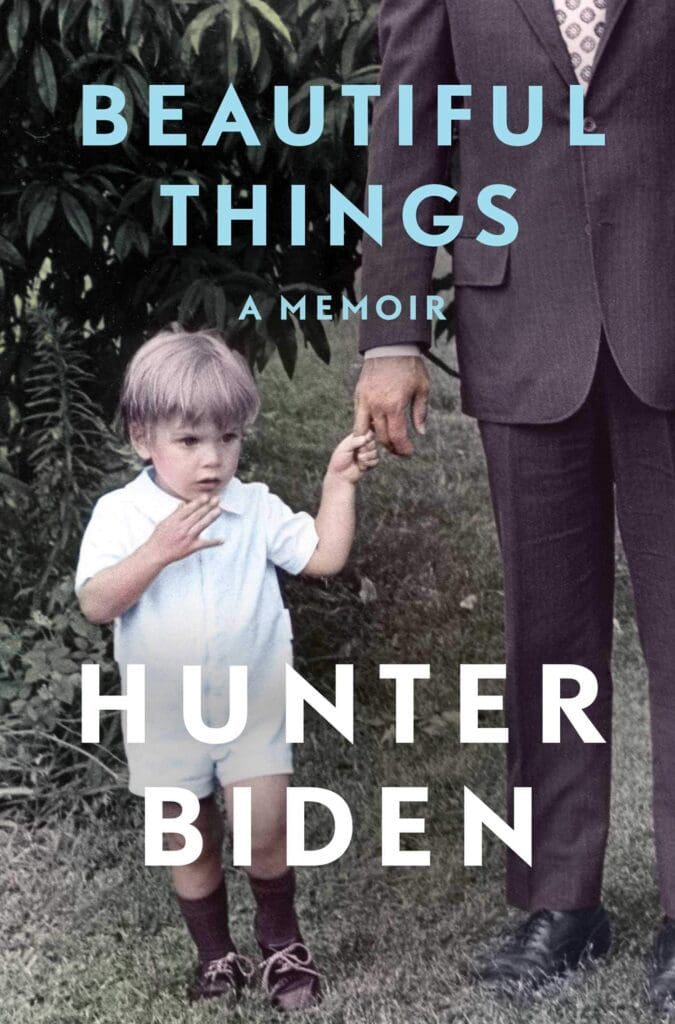“I’ve smoked more cheddar popcorn than anybody on the face of the earth.” This line from Hunter Biden’s new memoir catches him at the lowest of lows. At this point in his decades-long addiction, he’s scrounging around for drugs, desperately searching between the seats of his car for anything resembling crack. His favorite snack food left flaky little pieces that to his addict’s eye looked just like rocks.
Hunter Biden’s memoir, Beautiful Things: A Memoir (272 pages; Gallery Books/Simon & Schuster), is written with the acumen and craft of a born writer. This book is not the typically pointless and badly-written story of political intrigue. He doesn’t write to unearth the Bidens’ seedy side; in fact, he never holds back in defending his family’s honor and their record of public service. His book transcends the story of his family’s political history and stands as a powerful document of addiction and redemption.
As many have learned over the course of the last year, President Biden’s support of his errant son has been unwavering. But the most touching passages are those devoted to Hunter’s brother, Beau, whose untimely death from a brain tumor in 2015 shook the foundations of the entire Biden family. Beautiful Things is threaded with Hunter’s deep admiration for his older brother, an admiration that seems to surpass the admiration he feels for his father. The memoir includes a simple but powerful declaration to the reader: “Wish you could’ve known Beau.”
From the death of his mother and sister to the ludicrous accusations hurled by a presidential administration founded on hate and lies, Hunter Biden’s life has been one wrought with torment—but like his father, he’s pushed on. (Hunter writes about his father’s resilience throughout his long political career, including when President Biden was accused of plagiarism during his failed 1987 presidential run. “Dad didn’t break a sweat,” he writes. “[He] did what he always does in the face of adversity: put his head down and went back to work.”)
Thick with the kind of intrigue we associate with literary novels, the briskly paced Beautiful Things is, at its most comforting, a genuine and often poetic reminder that no matter how taxing life can be, we are always surrounded by “beautiful things.” This is ultimately the lesson Beau teaches him, and one that becomes increasingly important—and frequently impossible to heed.
Between the trauma he experiences as a child and his predilection for partying as a young man, it all turns so wrong so quickly. As Hunter reminds us, addiction escalates quickly. What begins as fun pivots to mayhem. Having battled alcoholism most of his life, Hunter graduates to crack cocaine after Beau dies. In the second half of the memoir, Hunter battles his grief over his brother’s death, his feeling of having disappointed his family, and his alcohol and crack addiction, too.
Accounts of drug and alcohol abuse are rarely told with this kind of honesty. Biden writes with the grit and grace of the best chroniclers of narcotic debauchery, writers like Hubert Selby Jr. and Jerry Stahl. He admits to acquiring something like a sixth sense for detecting where to score. He details what seems like an interconnected national network of narcotic distribution, but what is in reality nothing more than a series of junkie-laden convenience stores. The reader gets the whole story of drug addiction. Hunter doesn’t celebrate or condemn drugs, instead he does as any memoirist should—tell the story to the best of their recollection.
Those recollections will have you stopping in amazement. “I’ve been so desperate for a drink that I couldn’t make the one-block walk between a liquor store and my apartment without uncapping the bottle and taking a swig.” He writes about four-day-long crack binges in which he somehow holds on to the Biden family’s gift for industriousness. At one point he holes up in a hotel for six weeks and teaches himself how to produce crack from raw cocaine.
Beautiful Things could have benefited from more mention of the female Bidens, especially the emotional toll of Hunter losing his mother and sister and his relationship with his stepmother, First Lady Jill Biden. Because of an almost complete lack of female presence, in its lowest parts the narration dips into a celebration of fraternal brotherhood when the story is clearly about so much more.
But in the end, Hunter Biden comfortably surpasses even some of the best-known and celebrated addiction memoirs. While it’s impossible to completely separate this book from the political, this is not a book about politics nor even one about a famous political family. Beautiful Things is a book about love and struggle, a bracing story out of the great and terrible spectrum of the human experience.

